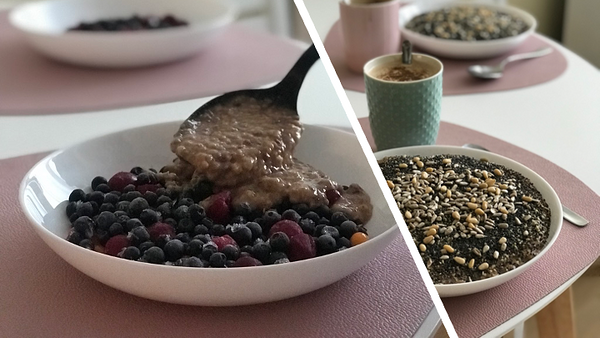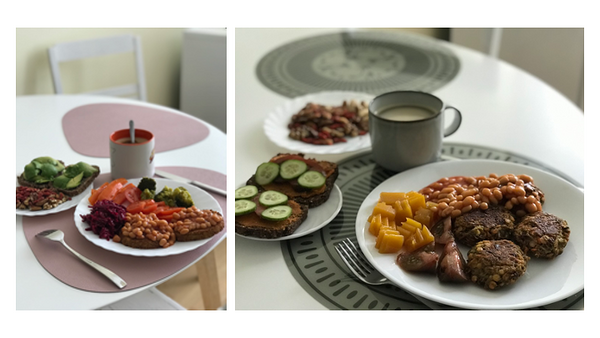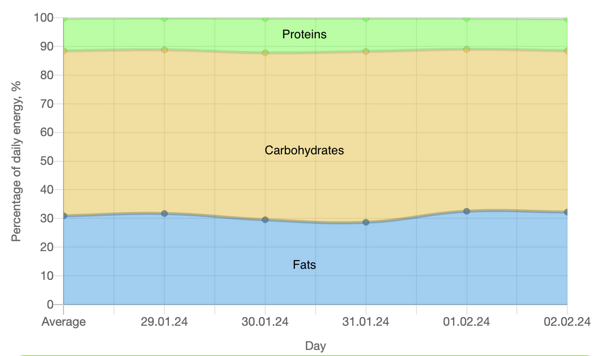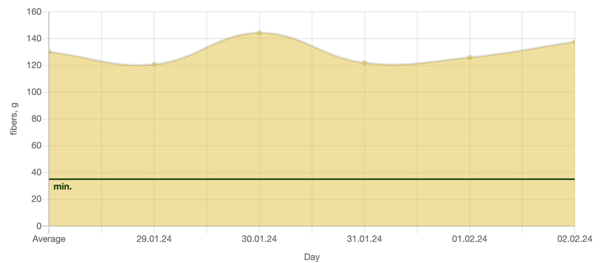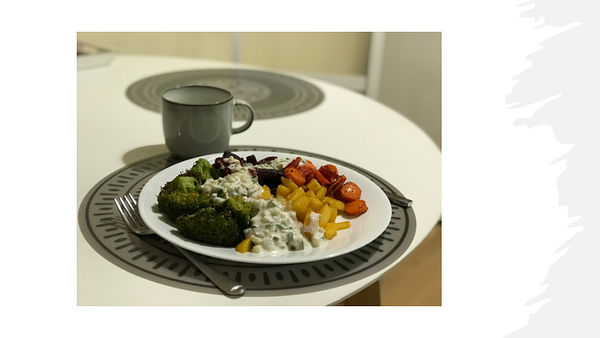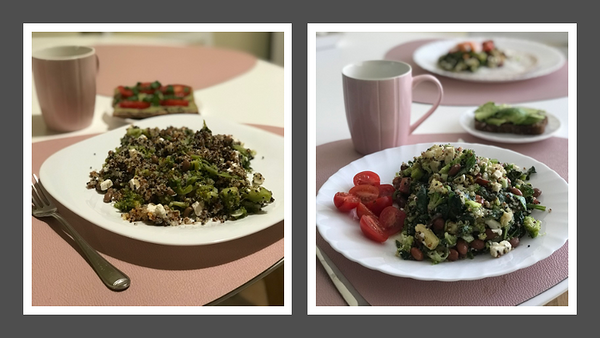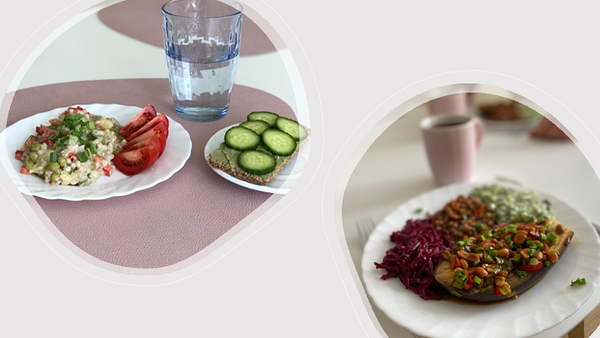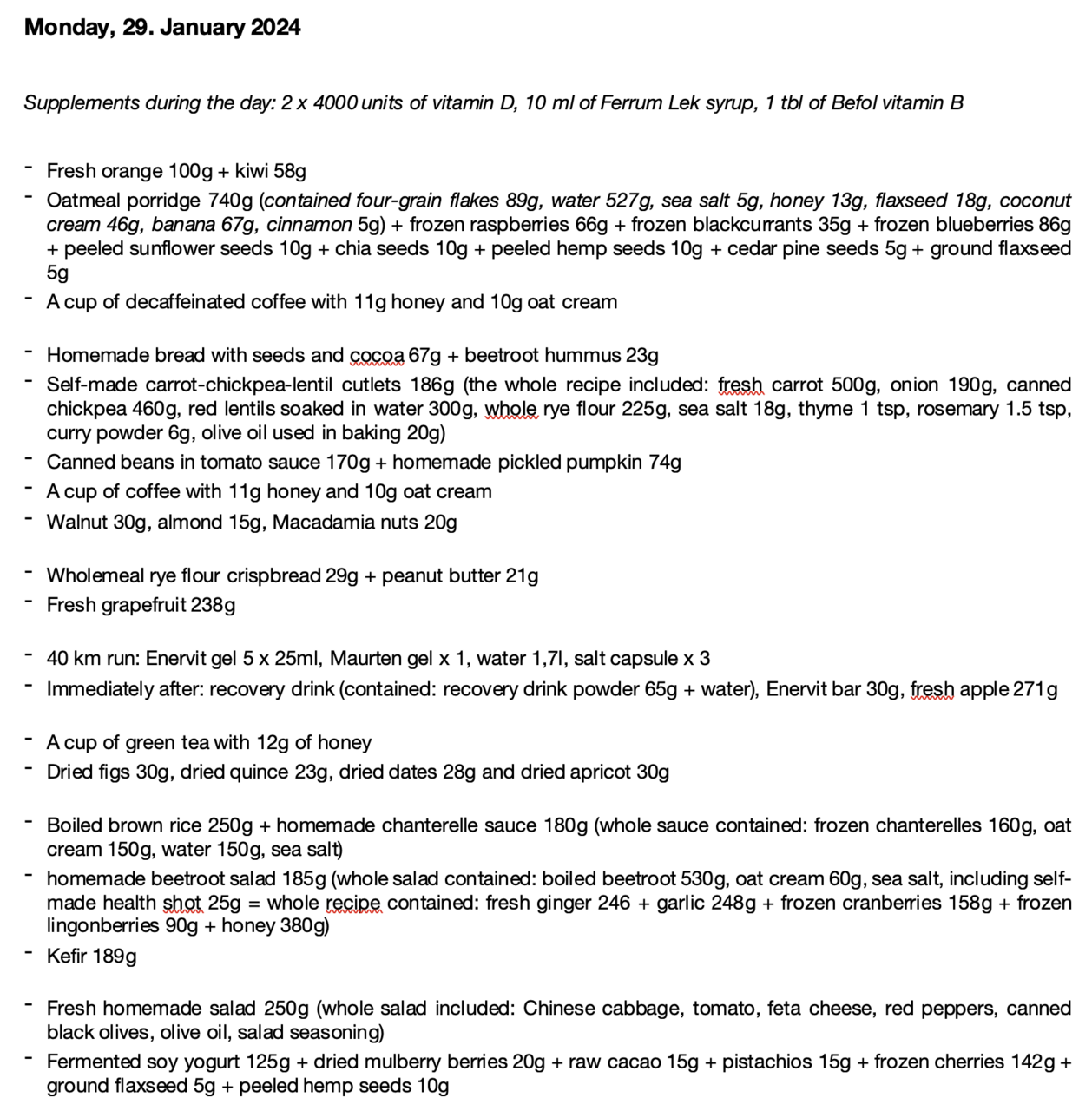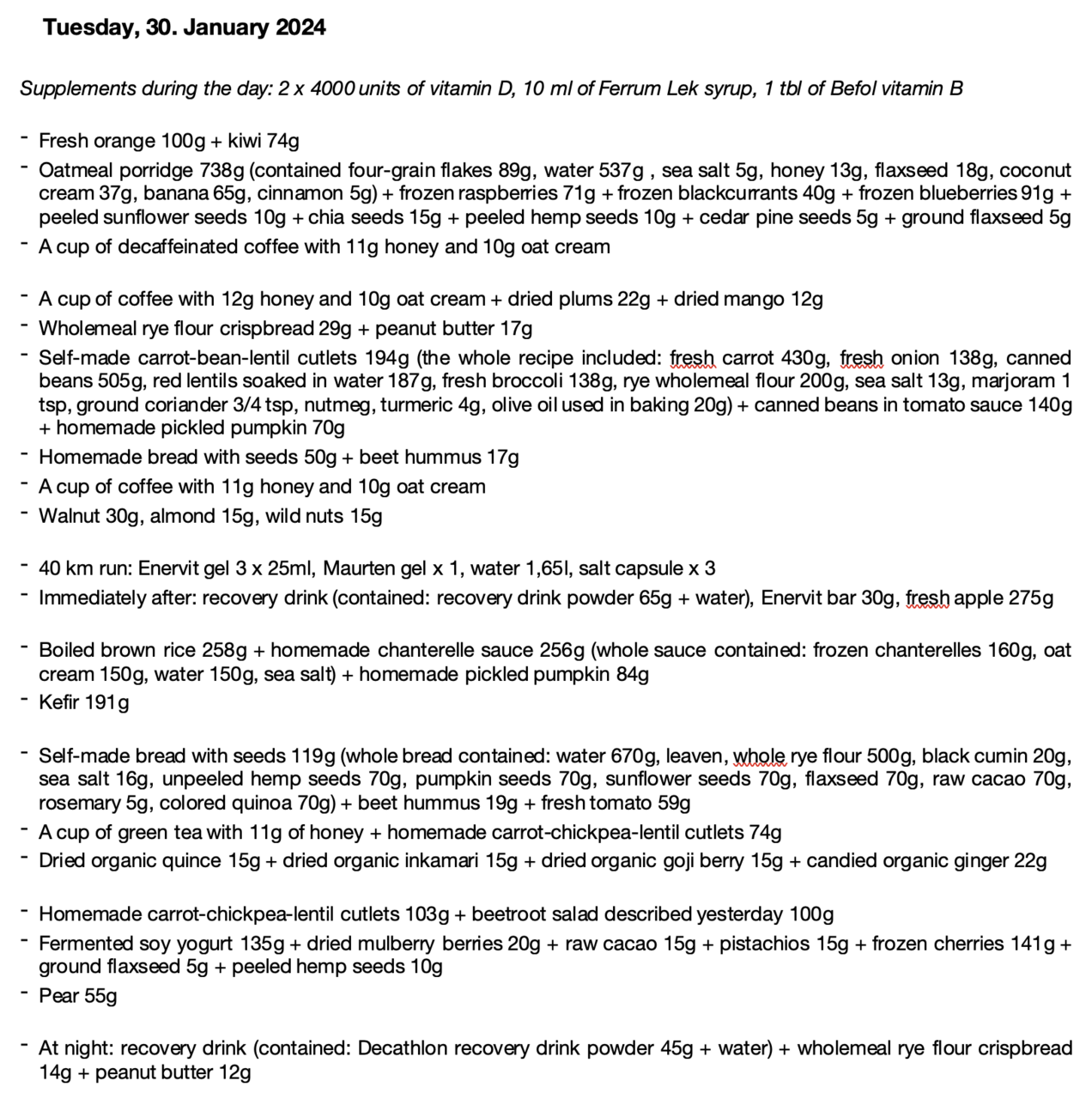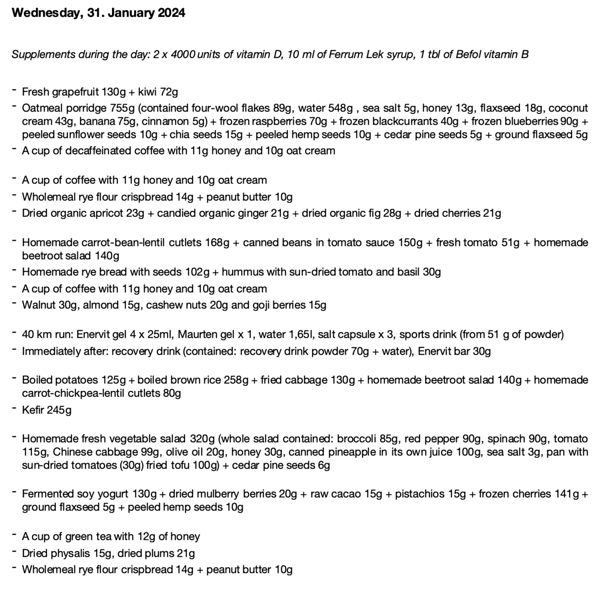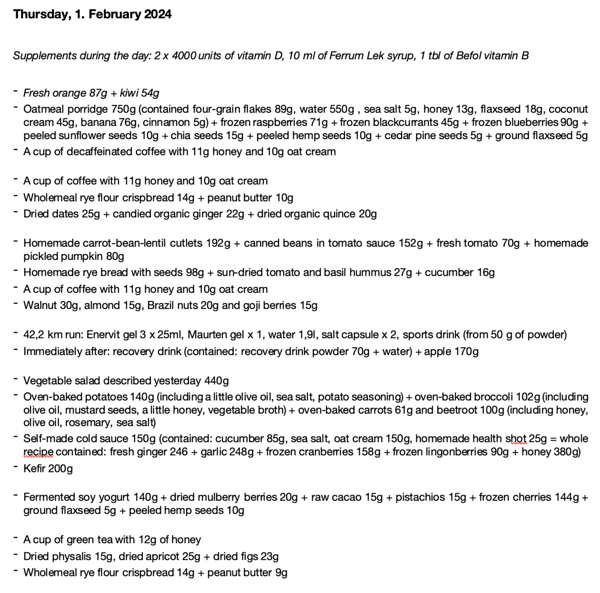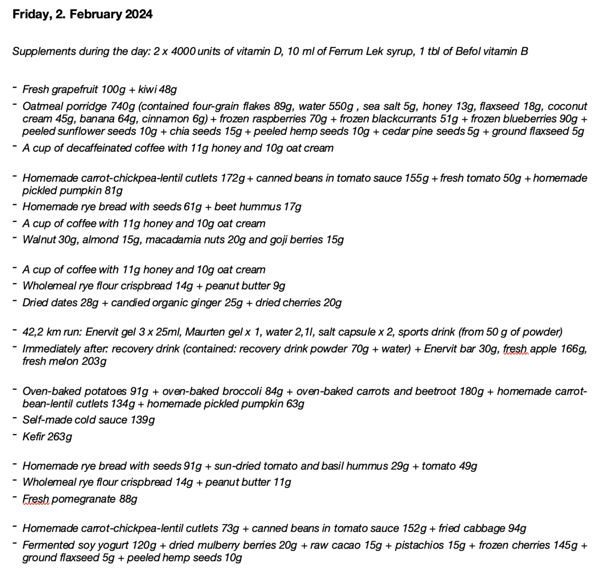My nutrition principles and preferences are often asked about, which is why I'll delve into them more thoroughly here. Nutrition is the number one priority. My body's endurance, its recovery speed, and the success of my ultra-challenges ultimately depend on food. For me, the challenge in ultrasports lies not in the hours, days, or kilometers required for training but in maintaining a balance of energy expended and consumed with quality food.
Know What You Eat
By quality food, I mean plant-based food in its most natural form possible. In other words, I avoid refined and highly processed foods whenever possible. True, some form of these may still be present in our menu, and reducing their presence to zero is not my goal. However, it's important that their proportion in the menu remains minimal.
I enjoy cooking, and I prepare the vast majority of my meals myself. This way, I have complete oversight and control over what my food contains. I rarely eat out. When purchasing pre-packaged or processed foods from the store, I always check the ingredients and prefer products whose ingredients I understand. I like the principle that processed food should not contain foods that I don't use in my kitchen.
FAQ question: Do you eat meat or fish?
I am not vegan. Although I don't eat meat, fish, or eggs at all, I don't make a fuss if they happen to be in my food. This means that while I don't use these ingredients when cooking at home, I am sometimes "forced" to consume them (e.g., when traveling) due to the lack of reasonable alternatives. Since this happens very rarely, it's not a problem for me. Fortunately, options, such as those found in roadside gas stations, are clearly improving.
There are currently a couple of dairy products in my menu (kefir and occasionally feta cheese), but as seen from my food diary below, they account for approximately 1-2% of my total daily calorie intake. The rest, 98-99% of my diet, is entirely plant-based (if honey is not taken into account). I intentionally include some dairy products in my daily menu because their complete absence could make my body either sensitive or intolerant to them. However, this could become problematic during ultra runs or ultra triathlons when dairy products might find their way into my diet.
I eat sweets during ultra races and challenges organized for myself
Outside of ultra-challenges or competitions, I do not consume sweets (e.g., chocolates, candies, pastries, cakes, ice creams etc) or sugary drinks (e.g., cola). However, during periods of continuous high-energy expenditure, such as all-day or multi-day sporting events, the energy demand is so immense that I have not yet found the ideal solution for how to eat 10,000 kcal and more energy with healthy food.
From my food diary below, you can get an idea of how much food I need to eat daily to cover my dayly energy expenditure of 5000-5500 kcal. Eating such a large amount of food is already difficult, let alone twice as much. So, finding a solution to this question is an ongoing process for me. However, I know from my own experience that in the end what matters most is what I eat most of my time. Since ultra-challenges only last a few days a year (e.g., approximately 11 days in 2023), my body copes well with it.
I have zero tolerance for alcohol
Alcohol has not been a stranger to me all my life. In the early years of adulthood, I drank a lot of alcohol, and undoubtedly, I abused it. However, I can't even remember the last time I drankd alcohol, but it must have been over ten years ago, sometime in 2013. The issue is not that I shouldn't or wouldn't allow myself to drink it, but I simply don't want to, I don't like it anymore.
Supplements
I take three supplements daily - iron, vitamin D, and a complex of B vitamins. It's particularly important to monitor B12 vitamin levels in a vegetarian diet. Through blood tests, I've determined that my body needs these three additional supplements.
I don't like to take vitamins and minerals as a prophylactic measure - meaning if my blood tests don't show a deficiency, I don't consider supplements. While it's often said that excessive intake of supplements results in expensive urine, I'm increasingly learning about studies that have found it can also have harmful effects on health.
By supplements, I also mean recovery and sports drinks. I don't consume them daily but mainly after demanding workouts (such as five marathons in five days). Considering dental hygiene, I always prefer gels over sports drinks. I use both (sport drink and gel) only during ultra-long indoor treadmill running sessions to maintain electrolyte balance under intense sweating conditions.
I don't count calories or follow nutrient ratios
I've been keeping a food diary for 11 years now. Although I always weigh my food when possible, I don't keep track of consumed kilocalories over the days. I simply don't need to because over the years, I've learned to understand my body well enough to recognize when I haven't been able to replenish expended energy or when my body needs more carbohydrates due to the nature of my workouts.
To give you a better overview, I've entered my five-day menu into the Nutridata.ee nutrition diary. What did I find? On average, I consumed around 5393 kcal per day during this 5 day training period. The distribution of nutrients is roughly as follows: proteins 11.4%, carbohydrates 57.6%, and fats 31% (see the graph below).
Source: https://tap.nutridata.eeFiber
Considering the dietary habits of an average individual, a lack of fiber poses a serious health risk. Fiber is found only in plant-based foods, with the highest content being in unprocessed or minimally processed foods. According to the Health Development Institute, an adult woman should consume a minimum of 25 g of fiber per day, while a man should consume 35 g. My fiber intake is good. On average, I consume 130 g of fiber per day.
Some Misconceptions Related to Nutrition
I used to think so too. Back then, I didn't pay much attention to nutrition in my life. If there's no interest and willingness to engage, it distorts our sense of time. Doing something reluctantly often feels like an eternity. One of my university professors gave a good example to illustrate the relativity of time - it depends on which side of the bathroom door we happen to be at the moment.
Today, however, I love cooking, and I no longer believe that preparing delicious food takes a lot of time. I have even fact-checked it with a clock. Let's take baking bread, for example. When I offer my friends to try the bread I baked myself, they often think that making bread is a complicated and time-consuming process. In reality, it takes me 15 minutes to make bread. The previous evening, I spend two minutes making the dough, which then ferments overnight. In the morning, I add various seeds, raw cocoa, salt, some spices, and whole wheat flour to the dough and put it in a bread mold to rise. It takes a maximum of ten minutes. In the afternoon, I put the bread in the oven to bake and set a reminder on my watch for an hour later. And it's done.
If cooking is not at all enjoyable, it doesn't mean it couldn't become so. Often, the reason lies in approaching it wrongly. Drawing a parallel with running, it's no secret that initially, I found it downright disgusting. Despite that, I quickly became friends with it. Over the last 23 years, I have run a total of 81,497 km, and today it is one of my most enjoyable activities.
Starting to keep a food diary has been one of the best and most beneficial decisions, although I didn't see it that way when I started. Initially, its purpose was to discipline myself. I had just left my day job as a lawyer and was placing much greater emphasis on sport in my life. I decided to make a fundamental change in my diet - it involved giving up meat and fish and focusing more on cooking my own meals.
I realized that my dietary choices determine whether my body can cope with the sudden increase in training loads. Honestly, keeping a food diary turned out to be super effective - I absolutely hated writing down foods that I knew were unhealthy or absolutley junk. But the rule was simple - if I ate that junk, I had to write it down. While it took some time to keep the food diary during the first few weeks, I soon became friends with it. Now it usually takes me five minutes a day. Not to mention the memory training :) - now I am able to remember what I ate during the day and often enter it into the diary only in the evening.
The Food Diary as a Learning Tool
Today, I no longer need the diary for discipline. Over time, it has become a great helper in other aspects. With the help of the food diary and blood tests, I have easily identified possible deficiencies, learned whether and what supplements and how much I need to take for my sports activities.
Keeping and analyzing the food diary has also shown me that the healty food is number one and by far the most important recovery agent after exercise. Only then do all other methods come into play to speed up recovery processes. I dare claim that if I hadn't paid such attention to my diet, I wouldn't have been able to stay healthy and injury-free all these years.
The food diary has also become a cookbook for me. Namely, when cooking at home and constantly trying out new recipes and adjusting them to my liking, I record them with precision by weighing. So, it's very easy for me to make delicious food that I've come to love again. For example, the current form of my breakfast porridge (recipe can be seen in the food diary below) has developed over a long time. At first, my morning pudding consisted only of salt, milk, honey, oatmeal, and plenty of jam :).
Blood Sugar
I measure my blood sugar daily, and keeping a food diary has helped me figure out how specific foods affect my blood sugar, in what order or combination eating certain foods leads to the greatest/smallest blood sugar fluctuations, and how the body's ability to handle carbohydrates is significantly better in the morning than in the evening.
Let's take my breakfast porridge again, for example. In the morning, my blood sugar is usually (after a good night's sleep) between 4.9-5.2 mmol/l. After eating the porridge (measured at different times, 15, 20, and 30 minutes later), the blood sugar remains the same as before eating. The porridge itself significantly raises my blood sugar, unlike when I eat it with plenty of berries and seeds. High blood sugar and its large fluctuations are not only a concern for diabetics but also greatly affect our health (including mood). Even in terms of my sports ventures, paying attention to this aspect is important. In ultrasports, there are already many mood swings and difficulties that fluctuations in blood sugar can easily amplify.
Today, I think and wonder how I could have ever thought that way. I don't have any problems with being overweight, but considering the scale of my sports ventures, healthy food plays an especially important role.
Most of the time, my challenge is how to eat back the consumed energy. While doing a lot of sports, my energy needs multiply, but that doesn't mean that the body's ability to eliminate the damage caused by unhealthy food increases. On the contrary, that ability remains the same - so when engaging in endurance sports, it's even more important to pay attention to what we eat.
My experience says that this aspect is not given much attention, and there's an understanding that "I can eat unhealthy food because I burn the energy from it." Therefore, it doesn't surprise me to read about studies conducted on ultrarunners, which reveal, for example, their increased risk of vascular calcification. Atherosclerosis is aptly called a silent killer, which doesn't cause any clearly recognizable symptoms, but over time accumulates into a life-threatening condition.
Myth 4: Formation of a New Dietary Habit Takes Several Weeks
Changing any deeply ingrained habit doesn't happen overnight or in just a few weeks. It's a common belief that it takes 21 days to form a habit. However, this isn't true. Researchers have debunked this myth. The idea of 21 days comes from an ancient study that found it was the average time a plastic surgery patient needed to adapt to their new appearance (e.g., a nose job). But at least we're on the right track. Adaptation is crucial for habit formation because the adaptation period is the most painful, making giving up the most likely.
Transitioning to a plant-based diet typically takes about three weeks for adaptation, as during this time, the initial significant changes and benefits become apparent in our consciousness, making it much more likely that we'll continue with a plant-based diet.
Reflecting on the time when I started with a vegetarian diet, it was the same for me. However, it's too early to speak about the formation of a new habit. My craving for meat and fish didn't disappear or decrease at all in the first three weeks. On the contrary, at times, they seemed even stronger. It wasn't until a year or more passed that I slowly began to notice that the smell or sight of meat no longer made my mouth water. It was from that moment that I could say that I had replaced my old habit with a new one. Which is quite logical - if you've been doing something in the same way for your entire life or for years, changing it can't happen in days or a few weeks. Today, meat or fish doesn't evoke any emotions in me, and I don't see them having a place in my menu in the future.
Myth #5: Vegan Food is Not Always Healthy
Veganism has become increasingly popular, leading to a significant increase in the variety of vegan products available in stores. From the most common temptations like donuts and pastries to highly processed foods, all are now available to vegans.
Producing food based on vegan principles does not mean that these foods have now become healthy from being unhealthy. Far from it. That's why I always thoroughly examine and critically evaluate new vegan products. Not all foods that are friendly to animals and our planet are beneficial for our health.
Myth #6: All or Nothing
In reality, it does not mean that you must give up all animal foods for the sake of your health. Significant benefits can be achieved simply by increasing the proportion of plant-based food. To illustrate, let's consider a nice round number: 80. If 80% of our menu consists of plant-based food, that's excellent.
Reaping the greatest benefits doesn't require 100% vegetarianism. However, this approach often doesn't work in our minds because the voice in our head tells us it's either all or nothing. This is where keeping a food diary might help overcome this mental hurdle. By not writing things down, we lack a real understanding of the proportions in which we consume things. This line of thought is illustrated by a study on chocolate consumption, which revealed that participants considered beneficial the amount of chocolate they happened to enjoy eating :).
What and How Much Do I Eat Then?
Below I will give you an example of my food diary. I do this based on five days from last week. You can see from the food diary that my daily energy requirement is approximately 5400 kcal. While the average man's daily energy requirement typically remains around 2700 kcal, which amounts to a million kilocalories per year, in my case, due to my trainings and ultra long races and challenges, this figure is twice as high. It's not uncommon for my body to wake me up at night demanding food.
Monday, January 29, 2024
- Weight: 75.4 kg
- Main workout of the day: 40 km run
- Energy consumed: 5113 kcal
Tuesday, January 30, 2024
- Weight: 75 kg
- Main workout of the day: 40 km run
- Energy consumed: 5606 kcal
Wednesday, January 31, 2024
- Weight: 75.9 kg
- Main workout of the day: 40 km run
- Energy consumed: 5394 kcal
Thursday, February 1, 2024
- Weight: 75.5 kg
- Main workout of the day: marathon (42.2 km run)
- Energy consumed: 5297 kcal
Friday, February 2, 2024
- Weight: 75.3 kg
- Main workout of the day: marathon (42.2 km run)
- Energy consumed: 5557 kcal
Book Recommendations
There are so many good and thought-provoking books on nutrition and health in general. However, if I were to recommend some to you, I would highlight the following:
Dr. Michael Greger's books:
- "How Not to Age: The Scientific Approach to Getting Healthier as You Get Older"
- "How Not to Diet: The Groundbreaking Science of Healthy, Permanent Weight Loss."
These books are evidence-based, covering all aspects and myths related to our health, convincingly demonstrating the power of proper nutrition. I enjoy listening to English-language books. Both of these books are narrated by the author himself. He is a pleasant and engaging storyteller, making them enjoyable to listen to. It's no exaggeration to say that these books play a central role in my dietary principles.
- Chris van Tulleken's book "Ultra-Processed People: Why Do We All Eat Stuff That Isn’t Food... and Why Can’t We Stop?"
- Jessie Inchauspé's book "Glucose Revolution: The Life-Changing Power of Balancing Your Blood Sugar."
